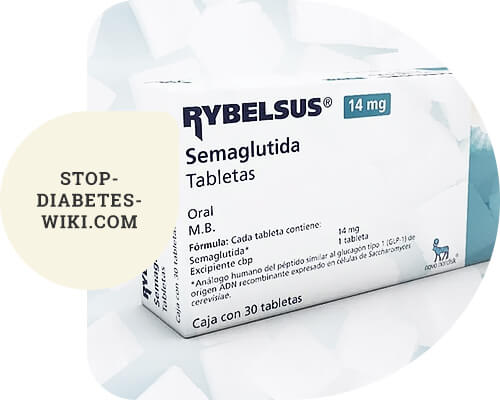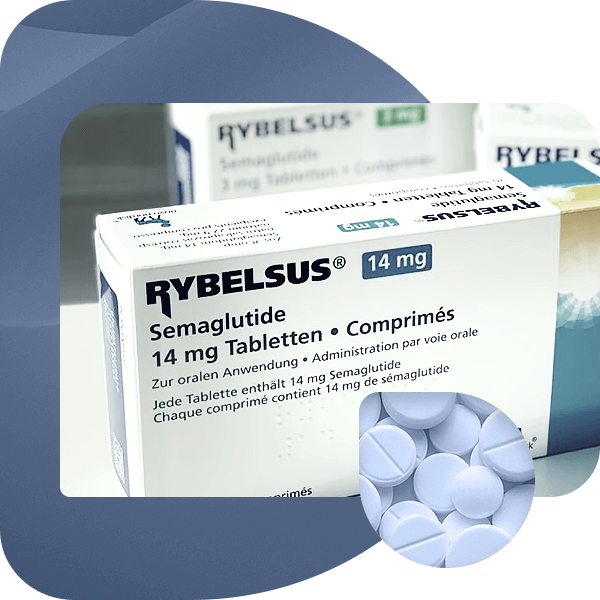Rybelsus and Weight Management: What Patients Need to Know
Unveiling Rybelsus: the Game Changer in Diabetes Control
Rybelsus, scientifically known as semaglutide, represents a remarkable advancement in the treatment of type 2 diabetes. Developed on the foundational principles of glucagon-like peptide-1 (GLP-1) receptor agonists, this oral medication enhances the body's natural ability to regulate blood sugar levels. Its mechanism of action is twofold: firstly, by stimulating insulin production when blood glucose is elevated, and secondly, by decelerating gastric emptying, which leads to a more gradual release of sugar into the bloodstream. This dual-action approach not only facilitates tighter glucose control but also minimizes the risk of glucose spikes post meals, a common challenge for individuals battling diabetes.
| Feature | Description |
|---|---|
| Chemical Composition | Semaglutide |
| Mechanism of Action | Stimulates insulin secretion, delays gastric emptying |
| Administration | Oral |
| Primary Use | Control blood sugar levels in type 2 diabetes |
| Advantages | Effective blood sugar management, potential for weight control |
Harnessing the power of semaglutide through oral ingestion marks a pivotal shift in diabetes care, offering an easier and more palatable option for patients, particularly those who are needle averse. The accessibility of Rybelsus amplifies its potential as a game-changer in diabetes management, promising a new horizon for those who have grappled with managing their condition. This breakthrough underscores not only the progression of therapeutic options but also the importance of innovation in addressing the complexities of chronic diseases such as diabetes. It provides a ray of hope for improved quality of life and better health outcomes for millions worldwide.
Exploring the Connection: Rybelsus and Weight Management
Rybelsus, a groundbreaking medication in the treatment of Type 2 diabetes, has emerged as a critical component in weight management for patients grappling with both obesity and diabetes. This oral semaglutide functions by mimicking the action of an incretin hormone, GLP-1, which plays a pivotal role in blood sugar regulation and appetite control. By stimulating insulin release in response to elevated blood glucose levels, Rybelsus not only aids in lowering blood sugar but also in reducing appetite, thus indirectly supporting weight loss efforts. Its mechanism of operation offers a dual benefit, positioning it as a preferred option for patients struggling to manage their weight alongside their diabetes.

The scientific community has been particularly interested in the potential of Rybelsus for weight management. Clinical trials have demonstrated significant weight loss in patients using Rybelsus as part of their diabetes care regimen, with reductions in body weight becoming increasingly pronounced over the duration of treatment. These findings underscore the drug's potential not just as a diabetes treatment but also as a tool for comprehensive weight management. It's important, however, for patients and healthcare providers to approach weight loss expectations with realism, understanding that individual results can vary and that Rybelsus is most effective when integrated into a broader lifestyle strategy that includes diet and exercise.
Despite its promising benefits, the journey with Rybelsus is not devoid of challenges, primarily in the form of side effects that can affect its tolerability. Gastrointestinal symptoms are among the most commonly reported, which, while generally mild and temporary, underscore the importance of a carefully managed and monitored introduction to the medication. Accommodating Rybelsus into one’s daily routine necessitates a personalized approach, one that considers the unique health profile of each patient and tailors the treatment to optimize both glycemic control and weight management outcomes.
Real Results: Patient Stories on Rybelsus and Weight Loss
As the medical community continues to explore innovative solutions for managing diabetes and associated conditions, the emergence of Rybelsus has marked a significant advancement. This oral semaglutide, primarily touted for its efficacy in controlling blood sugar levels, has also come under scrutiny for its potential benefits in weight management. Anecdotal evidence, bolstered by clinical studies, suggests that patients initiating Rybelsus treatment have experienced notable weight reduction. These outcomes are not solely numerical victories on the scale but represent a profound transformation in the lives of individuals grappling with the dual challenges of diabetes and obesity. The mechanism behind Rybelsus's action involves the regulation of appetite and food intake, leading to a natural decrease in caloric consumption and sustainable weight management.
Diving deeper into patient narratives, the stories reveal a spectrum of weight loss journeys, nuanced by personal challenges and triumphs. For many, the introduction of Rybelsus was a turning point, catalyzing significant lifestyle changes that extended well beyond pharmacological intervention. Individuals report an enhanced sense of well-being, attributed not only to the physical weight loss but also to the stabilization of blood glucose levels, which in effect, minimized the erratic spikes and crashes that exacerbate hunger cues and impulsive eating. These personal accounts serve not just as testimonials to the drug's efficacy but underscore the importance of a holistic approach to diabetes management, wherein Rybelsus acts as a keystone in a broader, patient-centered strategy.
The scientific language surrounding Rybelsus and its repercussions on weight underscores a fascinating interplay between biological mechanisms and behavioral outcomes. Side effects are an integral part of this narrative, as weight reduction often correlates with gastrointestinal disturbances, a commonly reported reaction to the medication. However, patients frequently emphasize that these transient discomforts are overshadowed by the long-term gains in health and quality of life. This juxtaposition of immediate challenges against enduring benefits highlights a critical aspect of diabetes and weight management: the necessity of individualized treatment plans that account for the multifaceted nature of chronic disease. Through these patient stories, Rybelsus emerges not just as a pill to be taken, but as a catalyst for comprehensive health transformation.
Navigating Side Effects: What to Expect with Rybelsus
Embarking on a treatment plan with Rybelsus, patients may encounter various side effects, an inherent aspect of nearly all pharmacological interventions. While Rybelsus has been a beacon of hope for individuals grappling with type 2 diabetes, offering a novel approach to managing blood sugar levels, it is imperative for patients to be aware of the potential side effects to navigate their treatment journey more effectively. Gastrointestinal symptoms are among the most commonly reported, including nausea, vomiting, diarrhea, stomach pain, and loss of appetite. These side effects are usually mild to moderate in intensity and tend to diminish over time as the body acclimatizes to the medication.

Beyond these gastroenterological reactions, there have been instances of more serious but rare side effects such as pancreatitis, an inflammation of the pancreas, and changes in vision. Therefore, it is critical for patients to maintain open lines of communication with their healthcare providers, reporting any unusual symptoms or changes in their health status promptly. This proactive approach allows for timely adjustments to the treatment regimen, ensuring both the efficacy and safety of Rybelsus therapy.
Moreover, understanding the mechanism of action of Rybelsus can offer insights into its side effect profile. As a glucagon-like peptide-1 (GLP-1) receptor agonist, Rybelsus simulates the action of an incretin hormone, which inhibits glucagon secretion in a glucose-dependent manner and enhances insulin secretion. However, this alteration in hormonal activity may contribute to the gastrointestinal disturbances observed. Educating patients about these potential side effects and the importance of adherence to prescribed dosages plays a crucial role in mitigating adverse reactions and optimizing overall treatment outcomes.
In navigating the side effect terrain of Rybelsus, a patient-centered approach is pivotal. Healthcare providers should tailor advice and management strategies to each patient's unique circumstances, considering their medical history, co-morbid conditions, and lifestyle factors. This includes discussing dietary modifications to alleviate gastrointestinal symptoms, setting realistic expectations regarding the onset of benefits versus the manifestation of side effects, and emphasizing the importance of regular monitoring and follow-up appointments. Such a comprehensive strategy fosters a supportive treatment environment, empowering patients to take an active role in their care and achieve the best possible results with Rybelsus.
Beyond the Scale: Additional Health Benefits of Rybelsus
Rybelsus, an innovative treatment option for type 2 diabetes, has been hailed for its efficacy in glucose regulation. However, its benefits extend beyond mere sugar control, presenting a multifaceted approach to health improvement. This medication, as a part of the GLP-1 receptor agonist family, not only assists in stabilizing blood sugar levels but also plays a significant role in mitigating cardiovascular risks. Studies have demonstrated a marked reduction in the incidence of heart attacks, strokes, and cardiovascular mortality among patients treated with GLP-1 agonists. Such outcomes underscore the potential of Rybelsus to offer a protective effect against some of the most daunting health threats faced by individuals with type 2 diabetes.

The impact of Rybelsus on metabolic health is another area of emerging interest. By improving insulin sensitivity and promoting a healthier distribution of body fat, Rybelsus contributes to a reduction in the risk factors for metabolic syndrome, which includes conditions like hypertension and abnormal cholesterol levels. This dual action on both glycemic control and metabolic syndrome components exemplifies the holistic approach Rybelsus takes towards patient health.
Delving further into the additional health benefits, Rybelsus has been linked to improvements in renal functions. The progression of diabetic kidney disease can be significantly slowed, providing a beacon of hope for many who suffer from this complication of diabetes. This renal protective effect highlights the comprehensive nature of the benefits provided by Rybelsus, extending its therapeutic reach beyond glucose control to vital organ protection.
| Benefit | Description |
|---|---|
| Cardiovascular Protection | Reduces the risk of heart attacks, strokes, and related mortality |
| Metabolic Health Improvement | Enhances insulin sensitivity and promotes a healthier body fat distribution |
| Renal Function Protection | Slows the progression of diabetic kidney disease, safeguarding renal health |
In essence, Rybelsus transcends its role as a mere antidiabetic medication, embodying a comprehensive tool in the management of diabetes and its associated conditions. Its multifaceted benefits highlight the importance of a holistic approach in treating type 2 diabetes, ensuring not just a focus on blood sugar levels but also on the overall health and well-being of patients.
Tailoring Your Treatment: Integrating Rybelsus into Your Routine
Integrating a new medication into one's daily regimen demands a holistic understanding of its mechanism, potential interactions, and the minutiae of its administration. Rybelsus, a groundbreaking addition to the diabetes management armamentarium, requires thoughtful consideration for seamless incorporation into existing treatment paradigms. At its core, Rybelsus operates by enhancing the body's inherent ability to lower blood sugar levels, an effect augmented by its GLP-1 receptor agonist profile. Patients are advised to take the medication on an empty stomach with a mere sip of water, ensuring optimal absorption and efficacy. This unique pharmacokinetic profile necessitates slight adjustments to morning routines, positioning Rybelsus intake precisely 30 minutes before the first meal, coffee, or other medications of the day.
The journey towards optimal health with Rybelsus is further refined by recognizing and managing its synergistic relationship with lifestyle modifications. Nutrition and physical activity, cornerstones of diabetes and weight management, play pivotal roles in magnifying the therapeutic benefits of Rybelsus. Healthcare professionals advocate for a balanced diet rich in nutrients and low in simple sugars, alongside a consistent exercise regimen, to enhance glycemic control and facilitate weight loss. This collaborative approach, marrying pharmacotherapy with lifestyle interventions, empowers patients to achieve their health objectives, underscored by the reductions in HbA1c levels and body weight observed in clinical trials.
Adverse effects, while generally mild and transient, require vigilance and open communication with healthcare providers. Gastrointestinal disturbances, most notably nausea, can often be mitigated through gradual dose escalation and dietary adjustments. Developing a comprehensive understanding of these potential side effects, and strategies for their management, is crucial for maintaining adherence and optimizing the therapeutic outcomes of Rybelsus. Empowering patients with the knowledge and tools to integrate Rybelsus into their daily lives is paramount, paving the way for a future where managing diabetes and achieving weight management goals becomes a more attainable reality.
By: Dr. Shira Eytan














